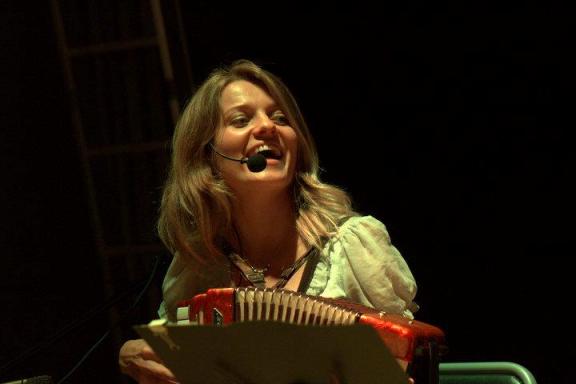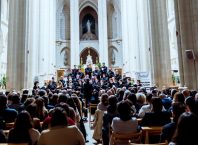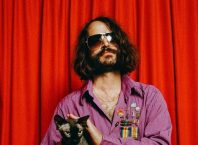“It’s a kind of Tikkun,” says Olga, “a way of healing the relations and history of Poles and Jews through music.” Folksinger and researcher, Olga sings the Yiddish songs with a sense of mission, hoping to revive the songs in the hearts and minds of Israelis, creating a bridge beyond the association with loss and destruction in the wake of the Holocaust, but with the life and love within the language and its traditions.

In the pursuit of an Israeli identity, Hebrew became the instrument of its creation, through the revival of the Biblical language and its creative leap into the 20th century, as the everyday language on the street, the language of books, stage and song. Yet in this creative burst of energy, a valued tradition was left behind, one that has all but vanished from contemporary consciousness and everyday speech, to become a museum relic, a memento of the European Jewish past. Yet the Yiddish language possesses an inherent vitality and appeal and one ought never to underestimate its regenerative powers. Yiddish is currently enjoying a renaissance in Israel as well as other countries, and treasures of Yiddish literature and song are finding new expression and interpretations through contemporary singers and musicians.
One such wellspring of tradition is YUNG YiDiSH, founded by Mendy Cahan, with two centers, one in Jerusalem and one at the New Central Bus Station in Tel Aviv. Olga will be performing there with Mendy and special guest Ittai Binnun, band leader of AndraLaMoussia on November 28th (Tel Aviv) and 29th (Jerusalem) in “Sounds of Galicia and the Carpathian Mountains.”
Classically trained, Olga began studying piano at the age of six, and holds a B.A. in Classical Music from the Fryderyk Chopin University of Music in Warsaw. Yet she turned away from music for many years, and acquired a Masters degree in Anthropology of Culture at the University of Warsaw. On this journey through music and anthropology, the different paths ultimately converged in Jerusalem, via Auschwitz.
“I came back to music in Auschwitz,” Olga recounted, “it was the first time I came in contact with Hebrew songs.” Hearing the songs in the course of a study retreat at Auschwitz, she became intrigued with Yiddish and enrolled in a course at the Jewish Theatre in Warsaw where she began to learn songs in Yiddish. At the same time, she returned to music, learning to play the accordion and accompanying herself in Yiddish songs. It was at this crossroads that the researcher and singer merged, and Olga embarked on the path that led to her first album “Jewish Folksongs from the Shtetl.”

Attending a Jewish Festival in Krakow, during a lecture on Israeli music as a melting pot, Olga asked: Why does Israeli culture ignore Yiddish? She was supported in her query by Eleanor Shapiro, Director of the Jewish Music Festival in Berkeley, who in turn introduced Olga to Barbara Kirschenblatt-Gimblett, who directed Olga’s attention to Jewish folksingers from Poland, among them Mariam Nirenberg.
Listening to recordings Nirenberg made in New York, Olga became fascinated with the songs and the “lost world of Polesye – muddy, archaic, multicultural, wild and undiscovered region of Europe.” Living in Ein Karem at the time, Olga sang the songs in the open air, taking pleasure in the sound. There, in the Jerusalem hills, she was also composing wordless melodies, niggunim, and found that some of these melodies blended well with the songs of Mariam Nirenberg. Nirenberg was a folksinger, singing as part of her everyday life, an extension of her daily work in the fields and in her home. Taking the music into the hills of Ein Karem, weaving together old and new melodies, Olga creates her own interpretation to the songs, intimately connected to the essence of Nirenberg’s life and work.
Many of the songs speak of sorrow, yet Olga’s voice, pure and resonant, imbues them with a beauty that makes the spirit soar. Tsvishn Di Berg Di Grine tells of a young girl driven to drown her baby, born out of wedlock:
Between green mountains
Flows a very deep stream
Millions of fish are there
And they are swimming along.
A beautiful girl sits there
She is holding a baby
She asks the child to suckle
From her breast for the last time.
The project and album, inspired by the life and work of Mariam Nirenberg, was produced in cooperation with the YIVO Institute for Jewish Research and Professor Barbara Kirshenblatt-Gimblett, who conducted field work on Nirenberg’s music. The album features musicians from the different cultures associated with Nirenberg’s music: Olga Mieleszczuk (vocal, arrangement) from Poland, Daniel Hoffman (violin) from USA, Ittai Binnun (clarinet, ney, guitar) from Israel and Ofer Malchin (accordion) from Israel.
Olga will be performing the songs from the album on a tour of the US, which will include a performance at the Lincoln Center in New York on February 21, 2013 and on opening night, February 2, 2013 at the Jewish Music Festival in Berkeley, with a repeat performance on February 3rd.
Israeli audiences are invited to rediscover Yiddish songs with Olga at the YUNG YiDiSH center:
November 28th at 20:00, New Central Bus Station, 108 Levinsky Street, Studio 5008, Fifth Floor, Tel Aviv.
November 29th at 20:30, 52 Yermiyahu Street, Jerusalem.
Links: YUNG YiDiSH website, facebook page.






ohhhh mal mal
yafe lach !
Comments are closed.